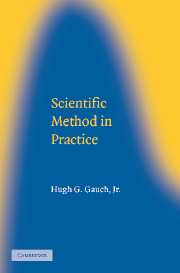Book contents
7 - INDUCTIVE LOGIC AND STATISTICS
Published online by Cambridge University Press: 05 March 2015
Summary
The logic that is so essential for scientific reasoning is of two basic kinds: deductive and inductive. Chapter 5 reviewed deductive logic, and Chapter 6 probability, which is a branch of deductive logic. This chapter reviews inductive logic, with “statistics” being essentially the term meaning applied inductive logic.
For better or for worse, statisticians are not unified. Rather, there are two major paradigms for induction: Bayesian and frequentist statistics. At stake are scientific concerns, seeking efficient extraction of information from data to answer important questions, and philosophical concerns, involving rational foundations and coherent reasoning.
In order for scientists to judge for themselves which paradigm can best address their research needs, they must understand exactly which questions these two paradigms are asking and exactly what data or information these paradigms require in order to provide answers. By understanding the relative merits of different statistical paradigms, scientists have much to gain in the way of efficiency and productivity.
This chapter cannot possibly do what entire books on statistics do – present a comprehensive treatment. But it can provide a prolegomenon that will clarify the most basic and pivotal issues, which are precisely the aspects of statistics that scientists generally comprehend the least. The main objectives are to depict and contrast the Bayesian and frequentist paradigms and to explain why inductive logic or statistics often can function just fine despite imperfect data, models, and scientists.
- Type
- Chapter
- Information
- Scientific Method in Practice , pp. 217 - 268Publisher: Cambridge University PressPrint publication year: 2002



